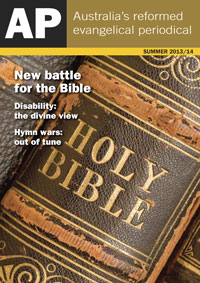 AP ramped up the rhetoric for the cover of a recent edition of their magazine. “New Battle for the Bible” and “Hymn Wars” were advertised as two of the feature articles in the issue. The byline for the main article was even more dramatic: “Battle for the Bible: Christians Must Defend Inerrancy or Watch the Church Die.”
AP ramped up the rhetoric for the cover of a recent edition of their magazine. “New Battle for the Bible” and “Hymn Wars” were advertised as two of the feature articles in the issue. The byline for the main article was even more dramatic: “Battle for the Bible: Christians Must Defend Inerrancy or Watch the Church Die.”
This kind of language is a call to arms, a rallying cry to gather the faithful remnant in the face of an apparently devastating threat. It plays to the anxieties and insecurities of the target audience, and also suggests the anxieties and insecurity of those making the call. Its aggression issues perhaps from the dictum that the best form of defence is attack. But it goes on the attack by simplifying and polarising the issue and the communities involved in it. One is either on our side or they are an enemy. One either agrees with our analysis of the situation or they are enemies of Christ.
I am troubled that our politicians so readily use this kind of argument; more troubling yet is that it is fostered in the church. While it may “work” in the short term, I doubt the long term fruitfulness of such an approach. When one has an argument to make, inflated rhetoric becomes unnecessary. Gordon Coleman’s article in the magazine is a case in point. Entitled “Out of Tune: Why a Debate Over a Hymn Proves Central to Christianity,” his essay is calm and measured, firmly presenting his case with clarity and good grace. The rhetorical inflation on the cover to “Hymn Wars” was simply unnecessary and inflammatory.
I think we can do better than this.